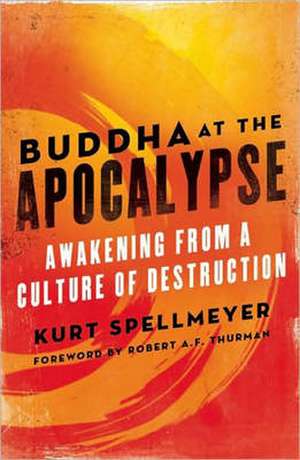Buddha at the Apocalypse: Awakening from a Culture of Destruction
Autor Kurt Spellmeyer Robert A. F. Thurmanen Limba Engleză Paperback – 31 mar 2010
Preț: 69.45 lei
Preț vechi: 95.13 lei
-27% Nou
Puncte Express: 104
Preț estimativ în valută:
13.29€ • 13.82$ • 10.97£
13.29€ • 13.82$ • 10.97£
Carte indisponibilă temporar
Doresc să fiu notificat când acest titlu va fi disponibil:
Se trimite...
Preluare comenzi: 021 569.72.76
Specificații
ISBN-13: 9780861715824
ISBN-10: 0861715829
Pagini: 175
Dimensiuni: 150 x 226 x 15 mm
Greutate: 0.3 kg
Editura: Wisdom Publications (MA)
ISBN-10: 0861715829
Pagini: 175
Dimensiuni: 150 x 226 x 15 mm
Greutate: 0.3 kg
Editura: Wisdom Publications (MA)
Recenzii
“The self-centered dream from which Kurt Spellmeyer strives to awaken us is not simply the dream of our individual ego but the dream of history. We must awaken from time itself, from beginnings, from progress, from goals and from visions of the end of time. Buddha at the Apocalypse challenges our assumptions about who we are, where we come from and where we are going, in our life and in our practice.”—Barry Magid, author of Ending the Pursuit of Happiness
“Buddha at the Apocalypse is easy-going, well written, and solidly reasoned—and lively in the way it interweaves Biblical analysis, Zen literature, and Western philosophy and sociology with popular culture and deep wisdom. I am delighted to greet this important and meaningful work and wish its author and many readers a fruitful walk in its garden of perceptive insights and heartfelt advice.”—Robert Thurman
“Buddha at the Apocalypse is a bold investigation into the role of religion in the creation of the environmental crisis. Spellmeyer is refreshingly direct in his evaluations, writing a manifesto of environmentally concerned Buddhism. His writing is crisp and honest, raising hard questions that help us confront the highly politicized role of religion as an ecological force.”—Richard K. Payne, editor of How Much is Enough?
“So often we see the future as something that will save us from the present—but what if our attempts to 'save the world' are based on the very way of seeing that is destroying it? Spellmeyer invites the reader to look differently at the nature of time itself, especially our belief in the inevitable benefits of Progress. A challenging and provocative book.” —David R. Loy, author of Money Sex War Karma and The World Is Made of Stories
“Spellmeyer’s Buddha at the Apocalypse opposes two conceptions of time: the endgame finality of the Western traditions, and the no-game now here-all of Buddhism. He speaks for a crucial shift in attitude towards the world and our human place in it. We are not, he asserts, bound for destruction, but bound by illusions obscuring an interpenetrating infinitely complex plenitude of miraculous being in which time and self are variables. This is no mystical diatribe, but a gentle reflection by the light of a Zen moon which shows how the whole show is alive, how we cannot save the world, nor fundamentally destroy it, but how with compassion we can embrace our shared being. How we connect with each other this moment and this day is the world, even as the static moment flows away in a march of moments, yet here still moment unending. Spellmeyer speaks for a profoundly simple ecology of mind, where world and mind are seamlessly one, and your acts and mine do make a difference.”—Robert Langan
“This book helped me to see our western culture more clearly, and inspired me to rebel against the Apocolyptic paradigm with renewed vigor.”—Noah Levine, author of Dharma Punx and Against the Stream
Notă biografică
Kurt Spellmeyer is an award-winning teacher and scholar in the English department at Rutgers University in New Jersey and a Rinzai Zen Master. He is the author of Arts of Living: Reinventing the Humanities for the Twenty-First Century and several other books.
Descriere
Timely and audacious, Buddha at the Apocalypse challenges us to look directly at the devastating assumptions underlying the very mechanisms of the modern world. We believe with certainty in the inevitable forward march of progress, in the natural rightness of humankind’s control of the environment, and, most pervasively, in the idea of an epic struggle that requires righteousness to utterly destroy evil. These images of apocalypse and dominance pervade our language, our politics, and, with coming of 2012, even our escapist entertainment. In Buddha at the Apocalypse, Kurt Spellmeyer offers us an alternative view that comes like breath of cool, fresh air in these times. Drawing on the Buddha, Spellmeyer makes an impassioned clarion call to awaken from the culture of destruction — or perish within it. The book also features a foreword by the most high-profile Buddhist academic in America — and possibly the world.
